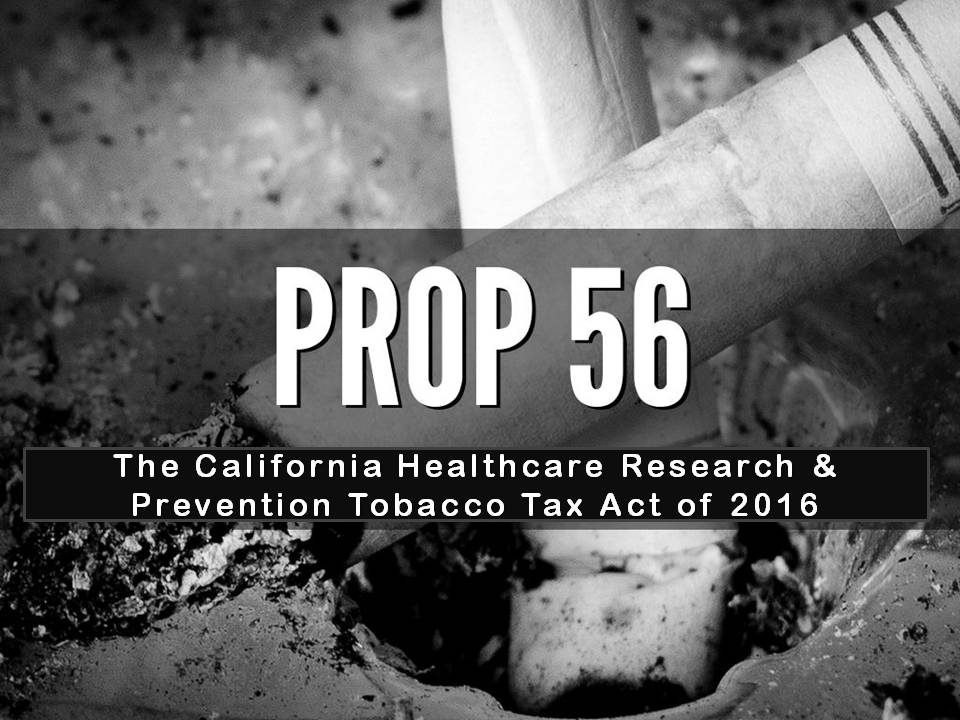In November 2016, the citizens of the State of California renewed their commitment to and support of quality healthcare, research, and the need to further control tobacco use.
Proposition 56, a voter initiative to increase state tobacco taxes, was approved with a remarkable 64.43% state-wide yes vote, establishing “The California Healthcare, Research and Prevention Tobacco Tax Act of 2016.” In addition to increasing the tax on a pack of cigarettes by $2, the first state tax increase on tobacco products in 28 years, the law levied a new tax on electronic cigarettes. A broad coalition of citizen and health organizations had put forward the initiative to save lives through healthcare services and reduce the disease and fiscal burdens of smoking and tobacco-use among all affected Californians.
As a result of the passage of the initiative, beginning in July 2017, significant amounts of new funds will go to addressing an array of critical healthcare, research, and public health needs throughout the state. Five percent of this new revenue will support research through the Tobacco-Related Disease Research Program (TRDRP) at the University of California, the research arm of the State's ongoing tobacco control efforts.
The added Proposition 56 revenue significantly expands and revitalizes TRDRP’s ability to advance health-related research and to inform California’s tobacco control efforts. The program’s current research priorities have a broad yet strategic focus on the effects of smoking and tobacco use on human health and behavior. Going forward, TRDRP anticipates expanding its grant funding approaches and priorities to realize the intent of Proposition 56, i.e. to fund "basic, applied, and translational medical research into the prevention, early detection of, treatments for, complementary treatments for, and potential cures for all types of cancer, cardiovascular and lung disease, oral disease, and tobacco-related diseases.” [Reference: http://vig.cdn.sos.ca.gov/2016/general/en/pdf/text-proposed-laws.pdf]. TRDRP will also continue its longstanding commitment to direct a substantial portion of funds for research addressing health disparities related to tobacco use and tobacco-related diseases disproportionately affecting specific populations in the state.
As of January 2017, the Governor's budget for fiscal year 2017-18 allocates five quarters of new Prop 56 revenues to the range of programs specified by the initiative. [Reference: http://www.ebudget.ca.gov/FullBudgetSummary.pdf?utm_source=Ed100]. Pending the May budget revision, these allocations could amount up to a sevenfold increase in the grant funding budget of TRDRP. These new funds will be available to support TRDRP grant awards submitted in response to the program’s Call for Applications to be released in early July 2017.
It is also important to keep in mind that, as stated in the Governor’s 2017 budget, the availability of funds under Proposition 56 is likely to decline in future years, mainly as a result of continued success in tobacco control and prevention, and the implementation and translation of medical research supported by the new tax revenue.
These declines would be consistent with the findings of recent TRDRP-funded studies on the economic impact of Proposition 56. They find that tobacco control programs funded through tobacco excise taxes will lead to reduced smoking rates, fewer smoking-related illnesses, and reduced healthcare costs for the state. Using an economic modeling approach, Drs. Max, Sung, and Lightwood (UCSF) report that a $2 dollar per pack increase in the tobacco excise tax in California will reduce smoking prevalence and in so doing save billions of dollars in future healthcare expenditures. For more detail, use this link on our website: [http://www.trdrp.org/news/tax-policy-updates.html]
Proposition 56 and its resulting infusion of funds are indeed the dawn of a new era in advancing California's leadership in innovative tobacco control and tobacco-related disease research initiatives.

